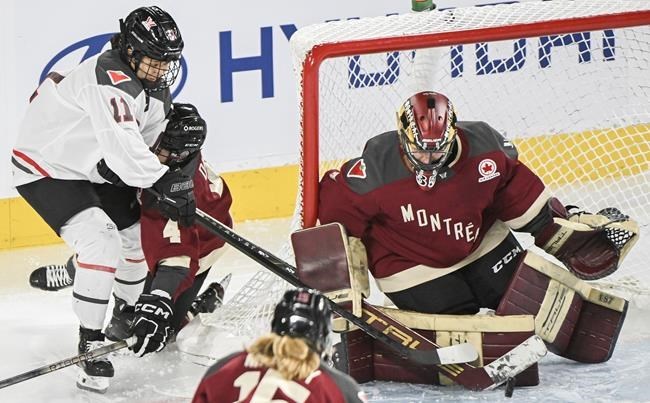The Professional Women’s Hockey League trade deadline is imminent, but the mood around the league is relatively calm.
The NHL is usually rife with suspense, urgency and rumours of last-minute deals flying around as its annual deadline approaches.
Things can always change, but for now PWHL general managers say their phones aren’t exactly ringing off the hook.
Many GMs are using words like “quiet” and “manageable” to describe the trade chatter ahead of Monday’s 4 p.m. ET embargo and rate their chances of making a move at 50-50.
"To put your bobber in the water right now, it's going to take the right trade,” Minnesota GM Natalie Darwitz said. “I don't think teams are going to trade just to trade."
Managers say several obstacles stand in the way of making a deal in this new league.
The NHL’s trade deadline typically features playoff-bound buyers aiming to bolster their squads for a Stanley Cup run and non-playoff teams trying to cash in on their assets.
To facilitate trades without depleting their teams, buyers offer packages centred around draft picks and prospects. PWHL GMs don’t have those resources at their disposal.
They can’t trade picks during the first season and don't have a pool of up-and-coming players. Teams can hold up to three reserve players but don’t have minor league rosters to draw from.
"To add to your team, you have to subtract something at the same time,” Ottawa GM Mike Hirshfeld said. “That's the challenge that all of us are facing."
The salary cap also limits flexibility and the fact all six teams are still competing for a playoff spot makes it tougher to strike a deal.
And that’s just the hockey side.
Unlike the NHL where minimum salaries approach a million dollars, PWHL players can earn as little as US$35,000 and the average salary is $55,000. The logistics of uprooting your life and packing your bags for another city aren’t the same.
Boston and Minnesota completed the first — and only — trade in league history Feb. 11 when Boston sent defender Sophie Jaques to Minnesota for Abby Cook and Susanna Tapani.
Players are entitled to reimbursement of up to $2,500 for moving costs, temporary lodging for up to two weeks and coverage of airfare or mileage through the PWHL's collective bargaining agreement. The league also assists with lease termination costs.
Despite having those supports in place, Darwitz stresses the importance of considering the human aspect alongside on-ice decisions.
“We'd be sending players halfway across the land here in Canada and the U.S., being the only team in the Midwest, so that would be a significant move across the country,” she said. “If you're going to do that to a player on a minimum salary that's super tough to do."
Darwitz says the Jaques acquisition “checked all the boxes” because she rejoined some former Ohio State University teammates on Minnesota’s roster, one of which she moved in with. Meanwhile, Cooke was familiar with Boston after playing for Boston University and Tapani was her roommate in Minnesota.
Montreal GM Danièle Sauvageau believes the human side of the trade “has to” work too.
“If it was up to me I would have 50 players in Montreal,” she said. “Even thinking about trading someone is not a good feeling."
On the flip side, some GMs say player movement is an integral part of a professional league.
"This is what we wanted,” Toronto’s Gina Kingsbury said. “A professional league is a professional league and the fact of the matter is that there's trades, there's movement, there's players that will play in other markets and will have to pack up their bags and go to another market. This has been done at all levels on the men's side for many years.
"We were very clear with our athletes from day one that trades will happen in this league.”
But players around Montreal’s PWHL team said they weren’t anxiously waiting for the deadline to pass the way NHLers might.
"I honestly didn't even know the trade deadline,” forward Maureen Murphy said. “Not really (anxious), not this first year anyway."
Sauvageau thinks that could change by next season.
“It is the first time for all of us, first year, so I really don't know what's going to happen,” she said. “Are we going to see like the NHL, like the last minute everybody's trading everybody?
"I don't know, because often you trade for picks or for future draft picks, and we cannot do that. I'm expecting next year is going to be probably busier than this year."
This report by The Canadian Press was first published March 16, 2024.
Daniel Rainbird, The Canadian Press
